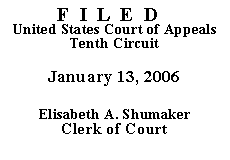

| JACK J. LOMBARDO,
Plaintiff-Appellant, v. JOHN E. POTTER, Postmaster General, United States Postal Service, Defendant-Appellee. |
|
Jack J. Lombardo appeals the district court's grant of summary judgment to his former employer, the United States Postal Service (USPS), in this action under Title VII of the Civil Rights Act of 1964, 42 U.S.C. §§ 2000e through 2000e-17. Mr. Lombardo complained that he was subjected to unlawful retaliation, in a variety of ways over a number of years, for exercising his rights under USPS's equal employment opportunity (EEO) system, and that ultimately he was forced to retire. In the decision underlying Appeal No. 05-3080, the district court granted summary judgment to USPS, finding that Mr. Lombardo had not exhausted his administrative remedies with regard to some of his claims and that he did not show that the other acts that he complained of constituted retaliation. In the decision underlying Appeal No. 05-3221, the court denied Mr. Lombardo's motion for reconsideration. We have jurisdiction under 28 U.S.C. § 1291, and we affirm both decisions.
I.
Since he filed his opening appellate briefs, Mr. Lombardo has made two additional filings seeking to add new issues on appeal. Issues not raised in an appellant's opening brief are waived. See United States v. Kimler, 335 F.3d 1132, 1138, n. 6 (10th Cir. 2003) ("We will not address issues not raised in the appellant's opening brief, especially where the arguments are based on authority that was readily available at the time of briefing."). Thus, we grant appellee's motion to strike Mr. Lombardo's supplemental pleadings filed on October 31, 2005 and November 2, 2005.
II.
We review the district court's grant of summary judgment de novo, viewing the record in the light most favorable to Mr. Lombardo, as the party opposing summary judgment. See Lanman v. Johnson County, 393 F.3d 1151, 1154-55 (10th Cir. 2004). Summary judgment "shall be rendered forthwith if the pleadings, depositions, answers to interrogatories, and admissions on file, together with the affidavits, if any, show that there is no genuine issue as to any material fact and that the moving party is entitled to a judgment as a matter of law." Fed. R. Civ. P. 56(c). We review the denial of Mr. Lombardo's motion for reconsideration for abuse of discretion. See Price v. Philpot, 420 F.3d 1158, 1167-68 n.9 (10th Cir. 2005).
Mr. Lombardo raises essentially the same arguments in both appeals. Most of his arguments (including his complaints about lack of discovery, and specifically the lack of depositions of USPS employees, the failure to submit his deposition changes to the court, the failure to submit documentary evidence, and the failure to amend the complaint to assert a constructive discharge claim) involve his dissatisfaction with his court-appointed counsel's performance before the district court. Essentially, Mr. Lombardo wants another chance to seek additional evidence and better support his claims. But it is now too late. In our legal system, parties generally are bound by the acts or omissions of their counsel. See Link v. Wabash R.R. Co., 370 U.S. 626, 633-34 (1962); Security Nat'l Bank v. John Deere Co., 927 F.2d 519, 520 (10th Cir. 1991). Mr. Lombardo's discontent with his counsel's performance does not establish grounds for reversing the district court's decisions. Generally there is no constitutional right to counsel in a civil action, and consequently "[c]ounsel's performance, however deficient, would not . . . form the basis for reversal of the trial court." See Beaudry v. Corr. Corp. of Am., 331 F.3d 1164, 1169 (10th Cir. 2003) (per curiam). Mr. Lombardo argues that he did not choose his counsel and he was forced to accept the counsel that the court appointed for him, but he could have chosen not to accept appointed counsel and to continue to proceed pro se. See 28 U.S.C. § 1654 (providing that "parties may plead and conduct their own cases personally or by counsel").
The district court comprehensively reviewed Mr. Lombardo's claims and arguments in its orders dated January 19, 2005 and May 13, 2005, and we affirm the district court's decisions for substantially the same reasons that the district court stated in those orders.
III. Appellee's motion to strike Mr. Lombardo's supplemental pleadings is GRANTED. Mr. Lombardo's additional information documents filed on October 31, 2005 in Appeal No. 05-3221 and on November 2, 2005 in Appeal
Nos. 05-3080 and 05-3221 are stricken from the appellate records. The judgments of the district court are AFFIRMED.
Entered for the Court
Circuit Judge
*. This order and judgment is not binding precedent, except under the doctrines of law of the case, res judicata, and collateral estoppel. The court generally disfavors the citation of orders and judgments; nevertheless, an order and judgment may be cited under the terms and conditions of 10th Cir. R. 36.3.